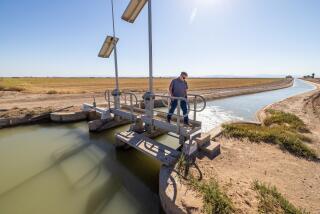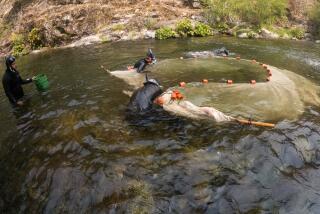Plan Would Buy Land to Save Fish
- Share via
Environmentalists and about a dozen farmers in the drought-parched Klamath Basin at the California-Oregon border announced Friday a proposal for the government to buy irrigated land to ease the conflict between agriculture and endangered fish.
The proposal, which will be presented at a congressional hearing in Klamath Falls, Ore., today, calls for the federal government to buy land from willing sellers within the Klamath Project based on financial need, and pay a total of $4,000 an acre to help the farmers move on to another livelihood.
The decision by the U.S. Bureau of Reclamation to shut off irrigation water this year to 90% of the 200,000 acres served by the Klamath Project--to conserve water for the survival of endangered sucker fish and threatened salmon--has caused deep divisions in the agricultural community of the Klamath Basin.
Thousands turned out last month for a bucket-brigade rally in Klamath Falls to call for changing the Endangered Species Act so water in Upper Klamath Lake would be restored to farmers, even in times of drought.
John Anderson, a rancher working about 3,000 acres irrigated by the Klamath Project who took part in talks with environmentalists to come up with the buyout plan, said he believed compensation for farmers facing financial ruin is necessary before any progress can be made toward long-term solutions.
“Everybody’s broke and everybody’s desperate,” said Anderson, 49, whose father was one of the many veterans invited by the federal government to homestead the Klamath Project after World War II. “People are fighting for their lives. A lot of people are older. Options are very slim.
Anderson figured that farmers who own as much as half of the 200,000 acres irrigated by the Klamath Project would be willing to sell under terms of the proposal.
Fred Fahner, a farmer who has been working with others willing to sell their land, said there is widespread feeling in the community that supporting a government buy-out is “like speaking against apple pie and motherhood.”
Fahner’s group--farmers willing to sell their land but separate from those talking with environmentalists--has proposed a three-point plan to reduce the agricultural demand for water, create new reservoirs and improve water quality.
Andy Kerr, working with the Oregon Natural Resources Council, said he met over the weekend with a dozen farmers to work out the proposal, which he will present in testimony to the House Resources Committee at a hearing in Klamath Falls. Hearing organizers estimate that as many as 7,000 people will show up.
“What the give-me-water-or-give-me-death crowd is saying is the only solution is to gut the Endangered Species Act,” said Kerr. “The Appropriations Committee that voted on the Bush proposal to change the Endangered Species Act didn’t get one vote for that proposal, and that’s in the House, controlled by Republicans.”
Scientists estimate that six years out of 10 there will not be enough water for farmers as well as the endangered suckers in Upper Klamath Lake, the Klamath Project’s primary reservoir, and threatened coho salmon in the Klamath River, Kerr added.
“The linchpin from the farmers’ standpoint is the economic transition payment,” Kerr said.
Kerr said land values before the water shut-off were about $2,500 an acre, but without irrigation are practically zero. The proposal calls for paying farmers fair market value, plus a transition payment to bring the total to $4,000 per acre.
More to Read
Sign up for Essential California
The most important California stories and recommendations in your inbox every morning.
You may occasionally receive promotional content from the Los Angeles Times.










